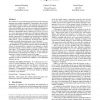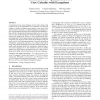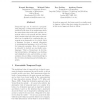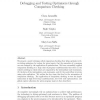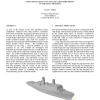1559 search results - page 57 / 312 » The Semantics of Future and Its Use in Program Optimizations |
129
click to vote
TLDI
2010
ACM
15 years 6 months ago
2010
ACM
ML modules are a powerful language mechanism for decomposing programs into reusable components. Unfortunately, they also have a reputation for being “complex” and requiring fa...
PEPM
2009
ACM
15 years 2 months ago
2009
ACM
A requirement of any source language is to be rich in features and concise to use by the programmers. As a drawback, it is often too complex to analyse, causing research studies t...
118
click to vote
KR
1991
Springer
15 years 1 months ago
1991
Springer
Temporal logic can be used as a programming language. If temporal formulae are represented in the form of an implication where the antecedent refers to the past, and the consequen...
ENTCS
2002
14 years 9 months ago
2002
We present a novel technique called comparison checking that helps optimizer writers debug optimizers by testing, for given inputs, that the semantics of a program are not changed...
WSC
2000
14 years 11 months ago
2000
As part of the design of the next generation Naval Amphibious Transport Dock Ship (LPD17), simulation was used to evaluate the arrangement and flow of cargo on the ship and to int...
